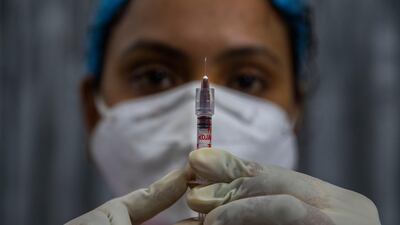The Indian government is considering giving nearly nine million non-resident Indians living in the UAE and other Gulf countries the right to vote by postal ballot in elections back home.
Dubai businessman Dr Shamsheer Vayalil met Sunil Arora, chief election commissioner of India, and will meet India's Law Minister Ravi Shankar Prasad, in New Delhi later on Monday to address a long-pending demand of NRIs to cast their ballot while living overseas.
The Election Commission of India said “the matter is under active consideration.”
The regulatory body said in a statement that its officials are in contact with the law and external affairs ministries to find an early resolution to the issue of implementing NRI postal voting in the Gulf.
Dr Vayalil said his meeting with the Election Commissioner on NRI voting rights was "very positive."
“I hope that the benefit of postal voting for NRIs will be extended as early as possible, preferably this year.
“The Election Commissioner of India acknowledged and appreciated the legal battle which I have been involved for the last several years.”
Dr Vayalil, chairman of the VPS Healthcare group, has been the voice of millions of NRIs keen to be part of the Indian electoral process from the overseas countries where they work.
He petitioned India's Supreme Court in 2014 to allow NRIs to exercise their right to vote.
Once the government and election commission clears the request, Dr Vayalil is hopeful NRIs in the Gulf can vote in state elections in Kerala, West Bengal, Tamil Nadu and Puducherry scheduled for May and June.
Currently, Indians who live overseas can only vote in elections at home if they travel back to their constituencies to cast their ballot.

It is impractical and expensive for most people to take time off from work to fly home for a few days to cast their vote.
In his petition before the court and in letters to Indian officials, Dr Vayalil has said if the government approved postal voting rights to all NRIs, they could exercise their democratic will without travelling to their respective constituencies.
"The GCC accounts for the majority of NRIs ... so any decision that deprives voting rights of the majority of Indian citizens would be seen as discrimination," he has said.
The meeting with Indian officials comes after Indian media reported that the Ministry of External Affairs planned to implement a pilot voting programme for non-residents living in the US, Canada, New Zealand, Japan, Australia, Germany, France and South Africa.
Indian officials did not include GCC nations, due to a lack of information about governments in the Gulf granting permission for voting, and the approvals that would be required, media reports said.
Dr Vayalil highlighted instances of American, Philippine and Korean missions in Dubai, Abu Dhabi, Oman and Qatar accepting absentee ballots from their citizens in national elections last year.
"Citizens of other nations living in the GCC have been exercising their voting rights," he said.
Since the majority of NRIs live in the Gulf, Dr Vayalil’s message was that they should be part of any pilot project.
“To exclude the majority of NRIs from the invaluable right of voting will be a discrimination … and therefore it is humbly requested to reconsider the said decision and to grant the Gulf NRIs the right to vote in the ensuing assembly elections,” Dr Vayalil said in an earlier letter to India’s Election Commission.
There are about 8.9 million non-resident Indians in six GCC countries. The largest population – 3.4 million – live in the UAE, followed by 2.5 million in Saudi Arabia, according to Indian government figures.
In hearings related to the 2014 petition, the Supreme Court directed the Election Commission to submit a report and asked the government to clarify its stand.
The lower house of India’s parliament in 2018 passed a bill to allow NRIs to vote by proxy or to authorise a relative to vote on their behalf.
This decision lapsed and was not passed by the upper house after the dissolution of the houses ahead of the 2019 general elections.



















